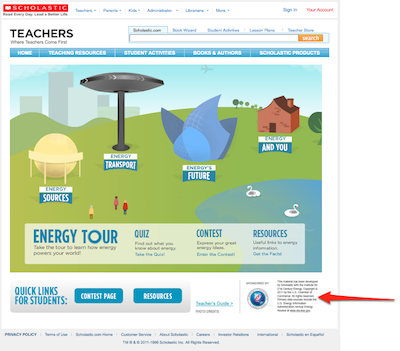Energy Tour, Brought To You By Scholastic and Climate Change Deniers
3 min read
Recently, the publisher Scholastic Inc. has been getting some publicity for the way they have been distributing a slanted curriculum favorable to the interests of the pro-coal lobby.
In addition to the Rethinking Schools article, the subject was covered in a NY Times editorial, and Mother Jones article.
Scholastic issued a statement describing their position:
"A tiny percentage of this material is produced with sponsors, including government agencies, non-profit associations and some corporations."
The Scholastic statement continues:
We acknowledge that the mere fact of sponsorship may call into question the authenticity of the information, and therefore conclude that we were not vigilant enough as to the effect of sponsorship in this instance.

So, given that Scholastic is aware that the "mere fact of sponsorship may call into question the authenticity of the information" I was surprised to see Energy Tour, a complete learning resource on energy use and consumption sponsored by the Institute For 21st Century Energy (a sub-group of the US Chamber of Commerce). Moreover, this material is all copyrighted by the US Chamber of Commerce. To be clear: Scholastic appears to be delivering an energy curriculum that belongs to the Chamber of Commerce, under the Scholastic brand.

By way of a brief refresher, the folks at the Chamber of Commerce have a spotty record on climate change, and have been among the leaders in denying climate change. Among other things, they wanted to put the science of climate change on trial:
"Chamber officials say it would be 'the Scopes monkey trial of the 21st century' -- complete with witnesses, cross-examinations and a judge who would rule, essentially, on whether humans are warming the planet to dangerous effect.
'It would be evolution versus creationism,' said William Kovacs, the chamber's senior vice president for environment, technology and regulatory affairs. 'It would be the science of climate change on trial.'"
Why is an enormous textbook publisher and distributor working so hard to distribute the message of people who are attempting to distort the scientific record?
As issues like this arise, it continues to make the point that Open Educational Resources are essential to the future of learning. Corporations have an obligation to make a profit, which is fine, but when the drive to make a profit trumps the obligation to provide unbiased learning materials, the people responsible for helping people learn have an obligation to seek out and create better material.











